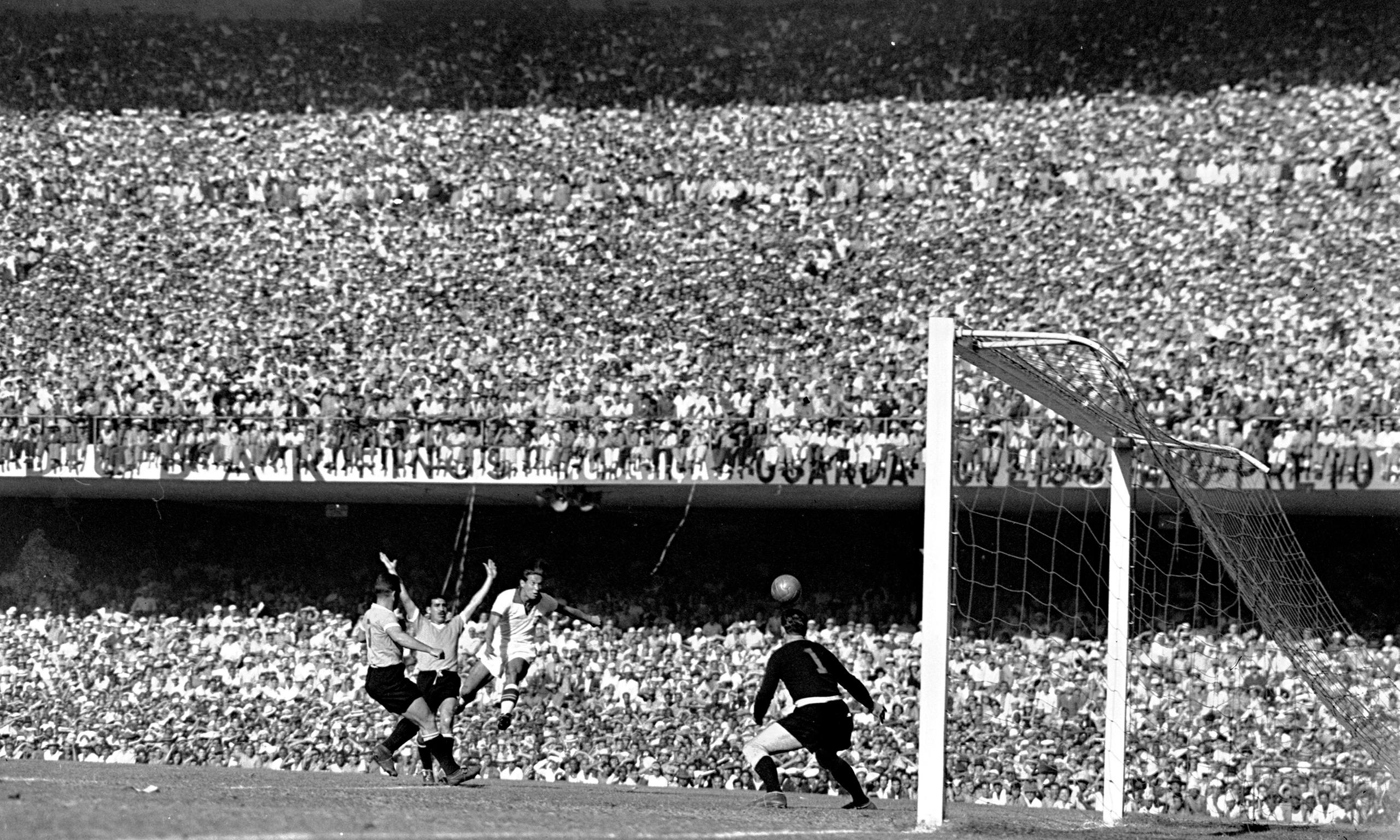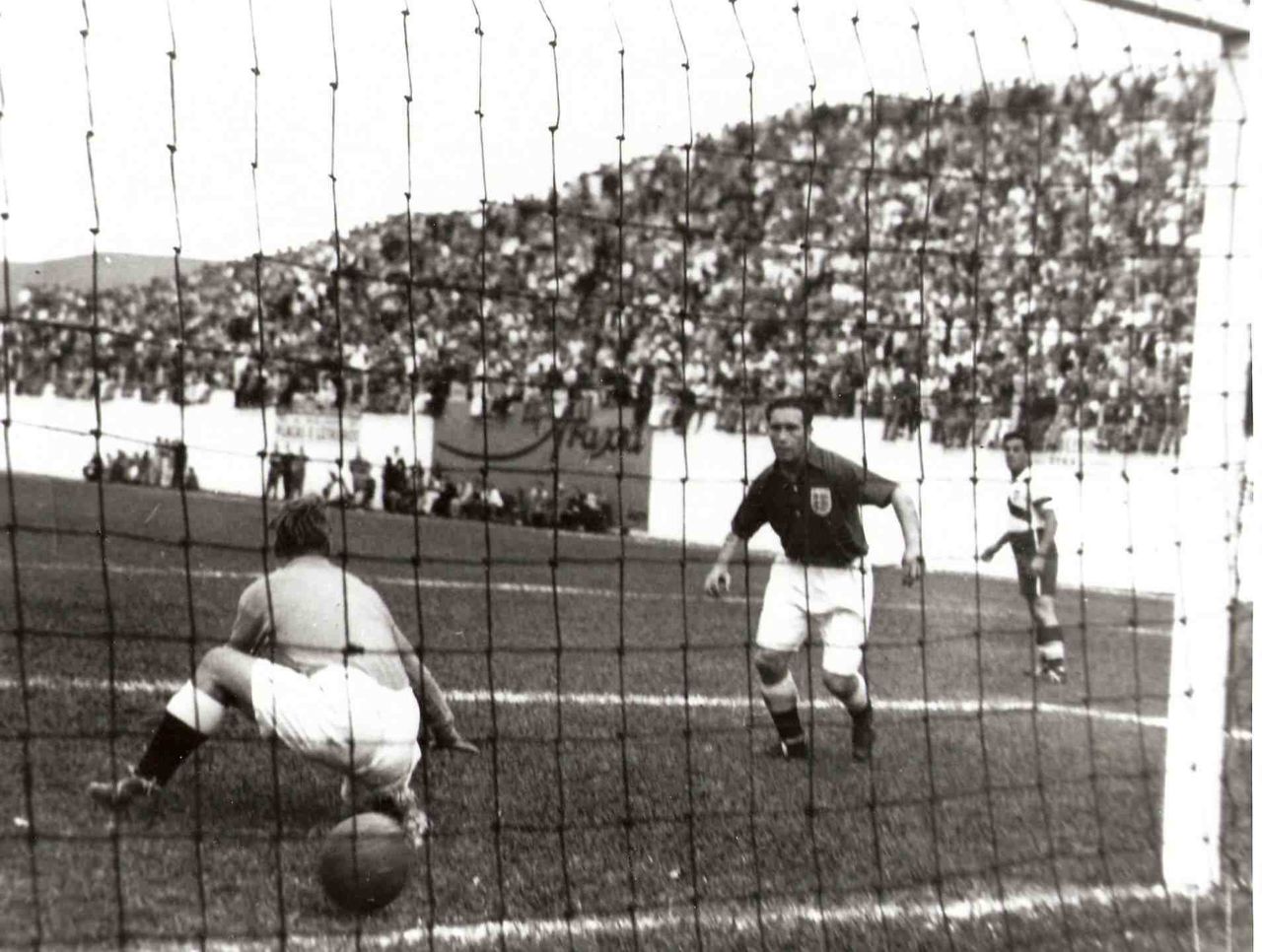What happened at the 1950 World Cup?
In the weeks leading up to the 2014 World Cup in Brazil, we'll set the scene for the next version of the greatest sporting event in the world by reliving each of its predecessors. We continue the build up today — after a 12 year break — with the first World Cup to be played since World War II.
Who: 13 squads from Europe (6), North America (2) and South America (5).
What: The fourth World Cup, and the first to be held after World War II.
Why: Football and the need to carry on.
When: June 24, 1950 to July 16, 1950.
Where: Six cities across Brazil.
The Final: Uruguay 2 - Brazil 1

The dramatic final wasn’t really a final at all. Instead of a straight knock-out tournament, the 1950 World Cup began with four groups. The winners of each progressed to a round-robin final group stage to decide the champion. After all four teams played each other once, the team with the best record would be the winners.
Fortunately for organizers, it worked out that the final match of the championship group was between the first and second-placed teams. Brazil would play Uruguay for the title in Rio De Janeiro in front of almost 200,000 supporters.
Despite only needing a draw to win the championship, the heavily favored Brazilians attacked relentlessly through the first 45 minutes. Only the efforts of Uruguayan half backs Obdulio Varela and Victor Andrade kept the match scoreless in the first half. However, only two minutes after the break, Friaça put Brazil up 1-0 with a tidy goal from the right side.
It appeared as though the floodgates were finally about to open for Brazil. Instead, underdogs Uruguay held strong and equalized 20 minutes later when their own winger, Alcides Ghiggia, beat the defense to send inside forward Pepe Schiaffino clear on goal. Then, with less than 12 minutes left, Ghiggia again beat the Brazilian left back, but instead of passing, he shot the ball from a tight angle past a diving Moacyr Barbosa for the winner.
How Did It Happen?
World War II left much of Europe in ruins. The scarce resources afforded war-torn nations were to be spent on recuperation, not sporting events. Nevertheless, FIFA was determined to restart the World Cup.
In stepped Brazil. The South Americans offered to host the tournament on the condition that it not be held in 1949, as FIFA preferred, but a year later. There were no other realistic options available so FIFA acquiesced.
Golden Boot
Ademir - Brazil (8 goals).
Major Innovations
The non-knockout format;
England competed; and
The trophy was officially renamed the Jules Rimet Trophy.
Substitutes?
No. Still four years away. An injury meant your side was down a man.
Craziest Match: United States 1 - England 0
England’s first trip to the World Cup is maybe the greatest story of comeuppance in sports. For the first three tournaments, English football deemed the World Cup unworthy of its presence, never doubting that England was the greatest national team in the world.
They opened the tournament with an easy 2-0 win over Chile, but had no idea what was in store for them in their next match against the United States. Before the tournament, England had beaten both Italy and Portugal handily, while the U.S. had lost their last seven international matches by a combined score of 45-2.
Nonetheless, after holding off the English to start the match, the U.S. came storming back. In the 37th minute, high school teacher Walter Bahr tried his luck from twenty-five yards out. As English keeper Bert Williams moved to intercept the soft shot from distance, Haitian immigrant Joe “Larry” Gaetjens emerged from out of nowhere to make a diving header that grazed the ball enough to put it into the back of the net.

The result was so surprising that several English newspaper readers assumed the scoreline was a misprint of 10-1.
The Legend
India qualified automatically after the Philippines, Indonesia and Burma all withdrew. However, after the draw for the first group stage, the Indian football association decided against going.
Rumor quickly spread that the Indian team had opted out because FIFA banned playing barefoot after the 1948 Olympics, where India had competed without the use of shoes. However, the decision had more to do with travel costs and a lack of organization from the Indian FA.
Other Nations That Wouldn’t/Couldn’t Compete
France, after organizers refused to alter a schedule that would force them to play two matches 3,000 kms apart.
Scotland, who had already qualified, after coming in second to England in the “Home Championship.”
Argentina, after a dispute with the Brazilian Football Confederation.
Germany (occupied), after FIFA banned them.
Japan (occupied), after FIFA banned them.
The Controversy
The format of the tournament meant that the group matches in the first round weren’t kept together based on geography. Several sides had to travel great distances between matches. Brazil was not one of those teams. The host nation played two of its three group matches in Rio de Janeiro while its other match was played in São Paulo.
They’re Back
Only two players who competed at the 1938 tournament in France made it to Brazil in 1950: Erik Nilsson of Sweden and Alfred Bickel of Switzerland.
The Sadness
The defending champions Italy were eliminated in the very first round of the tournament, with a loss to Sweden that made it next to impossible to advance. However, the real loss that the team faced was far more traumatic.
A little more than a year before the World Cup in Brazil, a plane transporting Italian club side Torino AC crashed into Superga Hill near Turin. 31 people died, including 18 players, along with club officials, journalists and the flight crew.
Italy's national team was severely affected, not just in the loss of eight members of its starting lineup, but also psychologically. The Italians had to be persuaded to come to Brazil, and when they finally relented, they traveled by boat rather than plane.
Motivating Factors
Before the final match, all of Brazil believed that the World Cup title was a foregone conclusion. Jacques Rimet prepared a speech in Portuguese to congratulate the winners. The Brazilian Confederation even had gold medals created with each player’s name engraved before the match against Uruguay.
Most notable, though, was the Brazilian newspaper O Mundo, which printed an early edition on the day of the final with a photograph of Brazil and the headline: These are the world champions. Uruguay's captain, Obdulio Varela, took exception to the assumption. He bought as many copies as he could find, laid them on the bathroom floor of the locker room, and encouraged his teammates to urinate on the newspapers.
Best Quote
In a speech before the game, Varela referred to his team’s underdog status in the media with this famous line, "Muchachos, los de afuera son de palo. Que empiece la función" Translated: “Boys, outsiders don't play. Let's start the show.”
No Time For Bleeders
Before the first round match against Brazil, Yugoslavia's Rajko Mitic hit his head against an iron girder as he left the dressing room, opening up a gash on his head. Nevertheless, the official in charge of the match refused to delay the kickoff, and Yugoslavia was forced to start with 10 men. Four minutes in, Ademir put Brazil ahead, and they’d go on to win 2-0.
Legacy
Brazil would never be the same. And that doesn’t just refer to the national team changing the design of their uniforms after the Maracanazo, as the upset in the final game came to be known.
There are several turning points in the success of Brazilian football that pundits identify, but few are as haunting as the 1950 loss to Uruguay. Victory was so certain to so many, and it was taken away so definitively.
The 1950 World Cup would be the only tournament to employ a round robin final round. Today, it’s common — even for FIFA — to refer to the Uruguay/Brazil match as the final, despite it being one of three matches for both sides.
HEADLINES
- Inter beat Como to keep in touch with leaders Atalanta
- Serie A basement dwellers Monza fire coach Nesta
- Mancini regrets leaving Italy for Saudi Arabia: I quit 'most beautiful' job
- Serie A roundup: Atalanta reclaim 1st place, Dybala gets Roma back on track
- Napoli hang on to beat Genoa as Balotelli squanders late chance